Unit 12 What did you do last weekend Period 1 Section A(1a-2d)课件(共47张PPT,内嵌音频)
文档属性
| 名称 | Unit 12 What did you do last weekend Period 1 Section A(1a-2d)课件(共47张PPT,内嵌音频) |
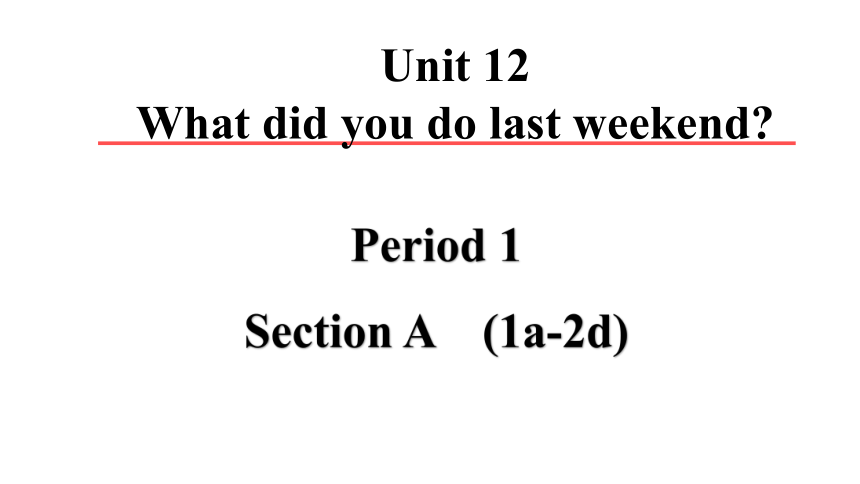
|
|
| 格式 | pptx | ||
| 文件大小 | 21.5MB | ||
| 资源类型 | 教案 | ||
| 版本资源 | 人教新目标(Go for it)版 | ||
| 科目 | 英语 | ||
| 更新时间 | 2023-12-18 00:00:00 | ||
图片预览

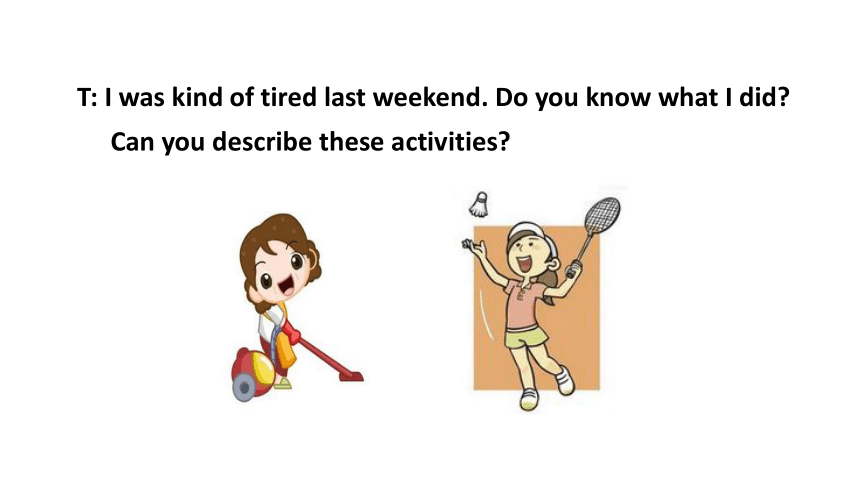
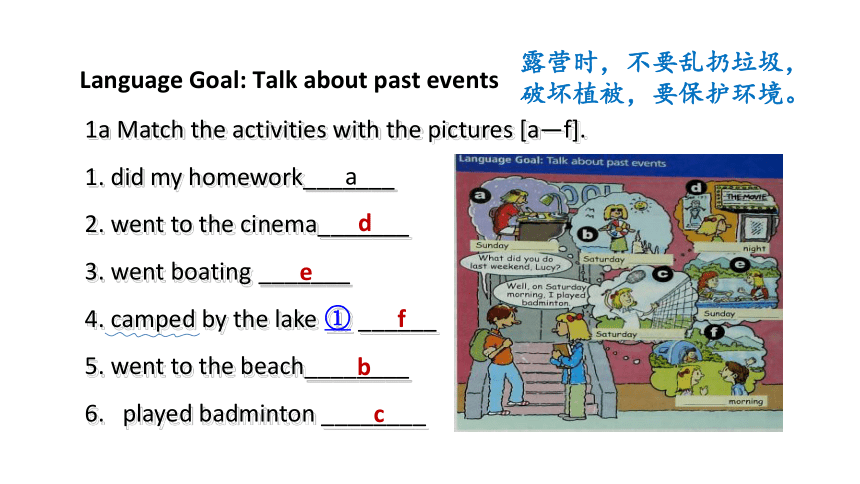
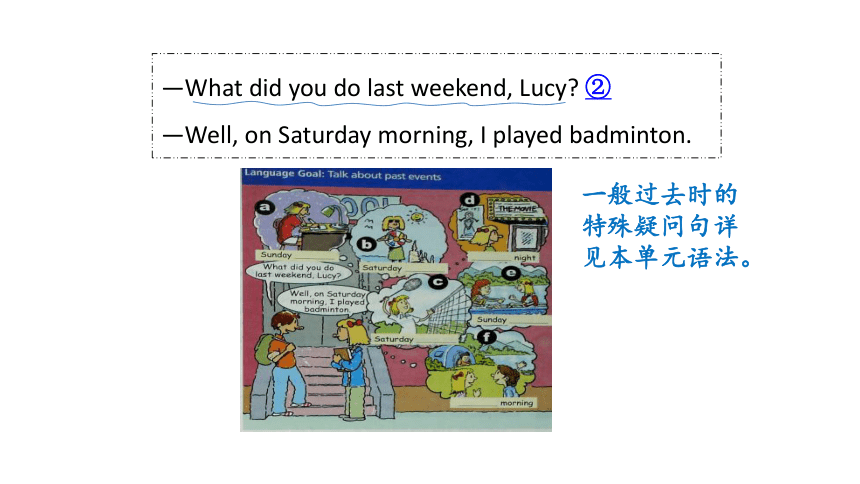
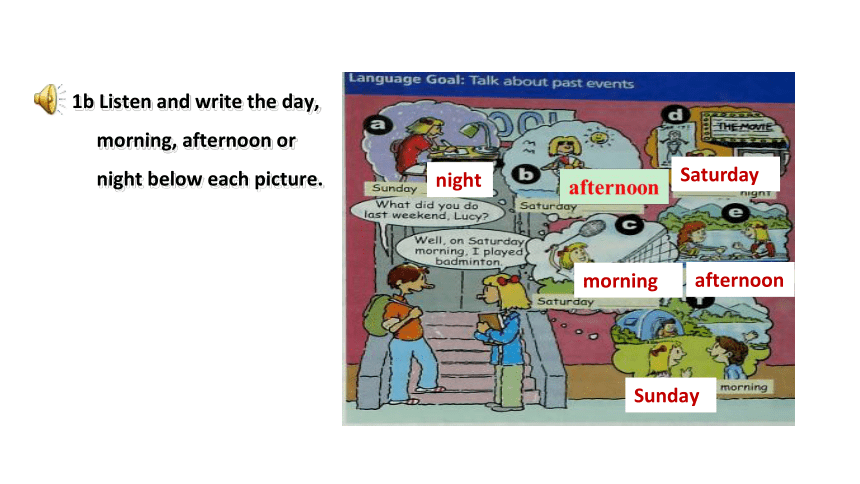
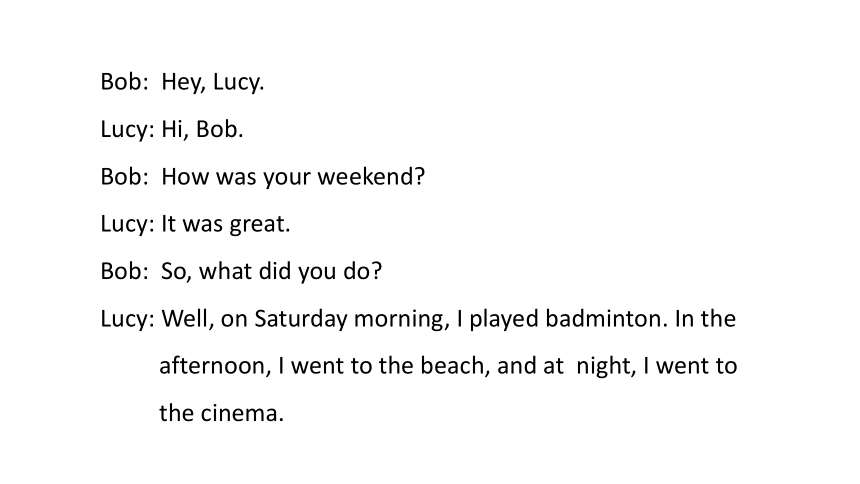
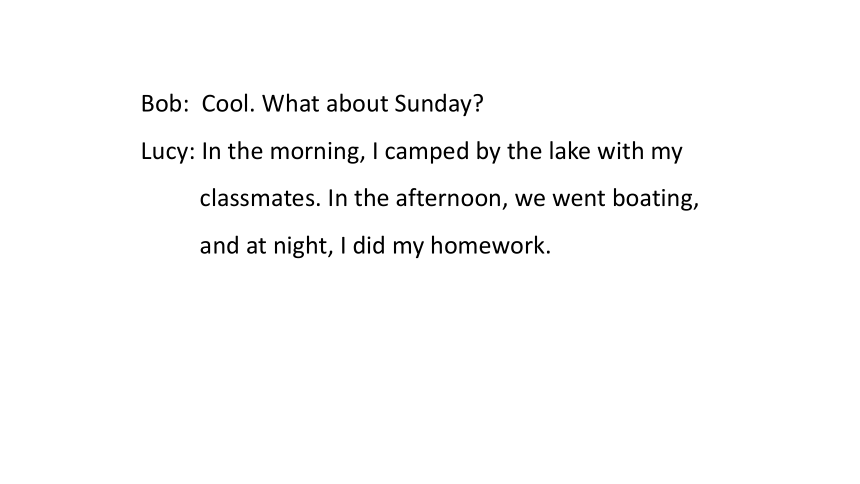
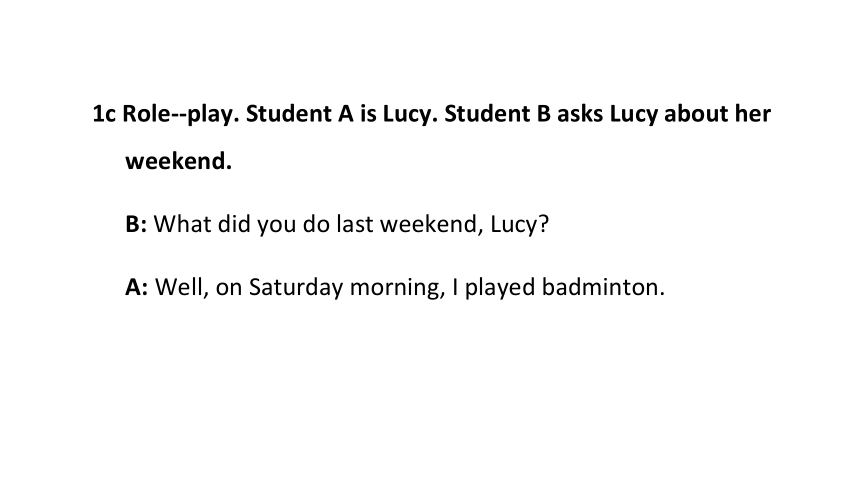
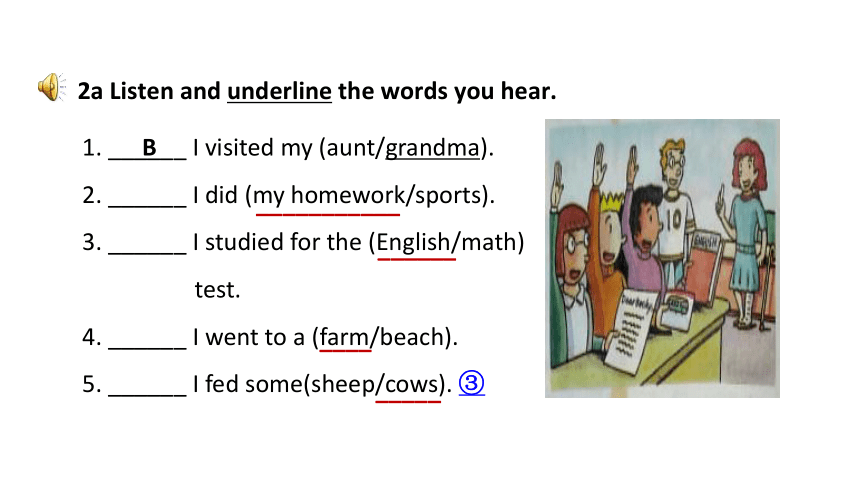
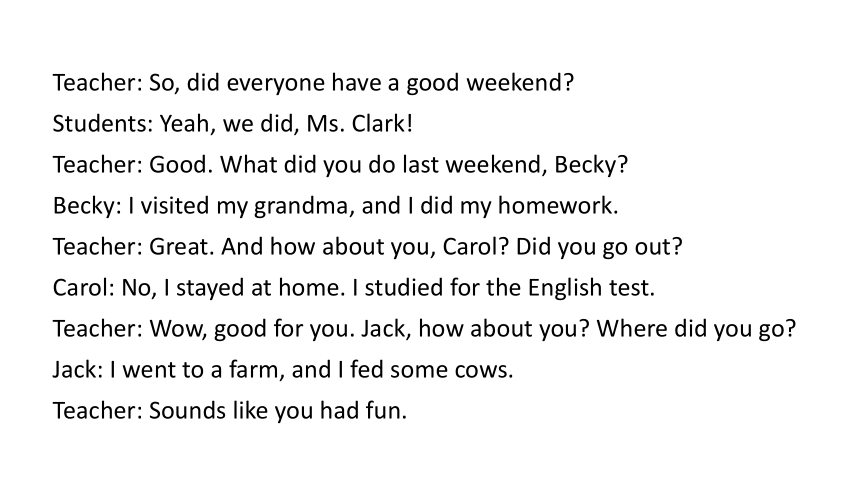
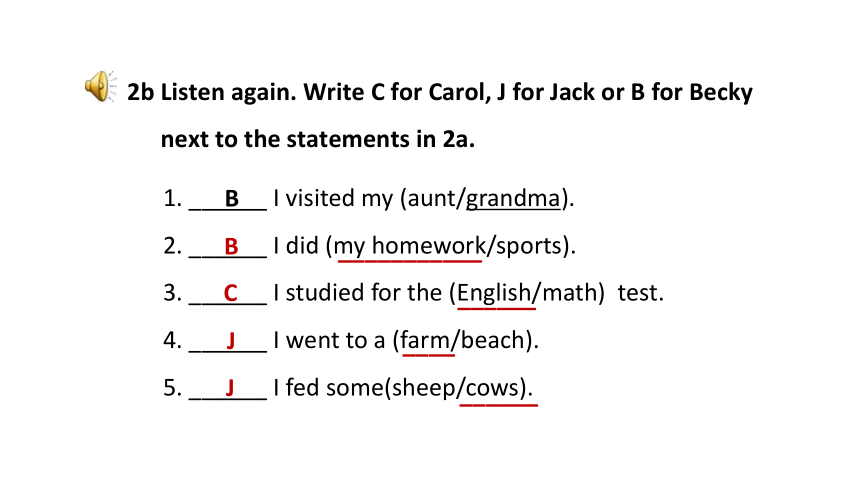

文档简介
(共47张PPT)
Period 1
Section A (1a-2d)
Unit 12
What did you do last weekend
T: I was kind of tired last weekend. Do you know what I did Can you describe these activities
Language Goal: Talk about past events
1a Match the activities with the pictures [a—f].
1. did my homework_______
2. went to the cinema_______
3. went boating _______
4. camped by the lake ① ______
5. went to the beach________
6. played badminton ________
a
d
e
f
b
c
露营时,不要乱扔垃圾,破坏植被,要保护环境。
—What did you do last weekend, Lucy ②
—Well, on Saturday morning, I played badminton.
一般过去时的特殊疑问句详见本单元语法。
1b Listen and write the day, morning, afternoon or night below each picture.
night
Saturday
morning
afternoon
Sunday
Bob: Hey, Lucy.
Lucy: Hi, Bob.
Bob: How was your weekend
Lucy: It was great.
Bob: So, what did you do
Lucy: Well, on Saturday morning, I played badminton. In the afternoon, I went to the beach, and at night, I went to the cinema.
Bob: Cool. What about Sunday
Lucy: In the morning, I camped by the lake with my classmates. In the afternoon, we went boating, and at night, I did my homework.
1c Role -play. Student A is Lucy. Student B asks Lucy about her weekend.
B: What did you do last weekend, Lucy
A: Well, on Saturday morning, I played badminton.
2a Listen and underline the words you hear.
1. ______ I visited my (aunt/grandma).
2. ______ I did (my homework/sports).
3. ______ I studied for the (English/math)
test.
4. ______ I went to a (farm/beach).
5. ______ I fed some(sheep/cows). ③
___________
B
______
____
_____
Teacher: So, did everyone have a good weekend
Students: Yeah, we did, Ms. Clark!
Teacher: Good. What did you do last weekend, Becky
Becky: I visited my grandma, and I did my homework.
Teacher: Great. And how about you, Carol Did you go out
Carol: No, I stayed at home. I studied for the English test.
Teacher: Wow, good for you. Jack, how about you Where did you go
Jack: I went to a farm, and I fed some cows.
Teacher: Sounds like you had fun.
2b Listen again. Write C for Carol, J for Jack or B for Becky next to the statements in 2a.
1. ______ I visited my (aunt/grandma).
2. ______ I did (my homework/sports).
3. ______ I studied for the (English/math) test.
4. ______ I went to a (farm/beach).
5. ______ I fed some(sheep/cows).
___________
B
C
J
J
B
______
____
______
2c Student A asks questions with who, what or where and Student B answers. Then change roles.
—Who visited her grandma
—Becky did. ④
2d Role-play the conversation.
Paul: Hi, Lisa. How was your weekend
Lisa: Great, thanks.
Paul: What did you do
Lisa: I worked as a guide at the NaturalHistory Museum. ⑤
Paul: Really How interesting! ⑥
口语中“Really ”常用于在听到对方的话语后表示感兴趣或 惊讶,意思是“真的吗?”或“是吗?”。
Lisa: Yeah, it was fun. They have a butterfly house with over 200 kinds of butterflies! I told the visitors about them and their living habits. ⑦ Did you have a good weekend
Paul: Yeah, it was good, but I'm kind of tirednow. ⑧ I stayed up late to watch the soccer game. ⑨
培养健康的生活方式,养成良好的作息习惯,早睡早起,精力充沛地去迎接每一天。
①camped by the lake
camp/k mp/v. 扎营; 搭帐篷
e. g. Last night, they camped in the forest.
昨晚他们在森林里扎营。
What a sunny day! Why not go camping with your friends
多晴朗的一天啊!为什么不和你的朋友们去野营呢?
考点1
camp 作动词时的常见搭配:
go camping 去野营 camp out 露宿;借宿
拓展: camp 用 作名词, 意为“营地; 度假营”。
e. g. Let’s go back to the camp. It’s getting dark.
让我们回营地吧。天黑下来了。
Did you go to the summer camp last year
去年你参加夏令营了吗
camp 作名词时的常见搭配:
① summer camp 夏令营 ② winter camp 冬令营
考题1: 这个周末我们去野营吧。
Let’s _________ __________ this weekend.
go camping
返回
②What did you do last weekend, Lucy
last weekend 上周末
“last + 表示时间的词(如night, weekend, month, year, Sunday, week 等)”构成表示过去的时间状语,其前通常不用at, on, in 等介词。
e.g. He went to the beach last Sunday. 上周日他去海滩了。
考点2
考向
weekend 的常见搭配:last weekend 上周末
this weekend 本周末 next weekend 下周末
返回
③I fed some (sheep/cows) .
sheep/ i p/ n. 羊; 绵羊
e. g. I raised a sheep last year.
去年我养了一只羊。
How many sheep are there on the farm
在农场有多少只绵羊
考点3
可数名词,单复同形。
sheep 的常见搭配:
black sheep 害群之马
sheep farmer 牧羊人
sheep wool 羊毛
a wolf in sheep's clothing 披着羊皮的狼
返回
考题2: [雅安] Look! There are some __________(绵羊)on the hill.
【点拨】sheep“绵羊”,some 修饰可数名词复数,sheep单复数同形。
sheep
④Becky did.
did 的用法
本句是一个省略句,用did 代替了上句中的行为动作,完整回答应是“Becky visited her grandma.”。该结构是为了避免与上句中的行为动作重复。
e.g. My sister didn’t go camping, but my brother did.
我姐姐没去野营,但是我哥哥去了。
考点4
考向
代替went camping
拓展:也可用so 代替上句中的相关内容。
e.g. —Do you think this new subject is useful
你认为这门新学科有用吗
—I think so.
我认为如此。
so 代替this new subject is useful
英语中常用do 的适当形式(do, does, did) 来代替上文出现的动作。
考题3: —Who got to the station on time
—I _______! In fact, I arrived there 5 minutes earlier.
A. was B. got
C. did D. do
返回
C
⑤I worked as a guide at the Natural History Museum.
work as 从事……工作
e.g. Her son is working as a math teacher.
她的儿子是一位数学老师。
My uncle works for an engineering company.
我叔叔在为一家工程公司工作。
考点5
时态要与上句保持一致!
as 后接职业名词
The famous actor is working on his new movie.
这位著名的演员正在忙于他的新电影。
The math problem is some difficult. Can you work it out
这道数学题有点难。你能算出来吗?
work 的相关短语:
① work for 为……工作
② work on 从事;忙于
③ work sth. out 算出;解决某事
考题4: I can’t visit the animals today. I’ll _______ a volunteer in the park.
A. work out B. work as
C. look after D. look up
【点拨】work out 算出;解出。work as 担任;当。look after 照顾;照料。look up 查找。根据句意可知,“我”将在公园做志愿者。
B
as / z , z/ prep. 作为;当作
e.g. Treat me as a friend. 把我当作朋友。
You can use the glass as a vase.
你可以把这个玻璃杯当作花瓶用。
As a student, I must study hard.
作为一名学生,我必须努力学习。
考点6
as 用作介词,后接表示职业、用途等的名词。含有as 的短语放在句首时,要与后面的内容用逗号隔开。
辨析: as 与like
as 以实际的身份或地位。
He spoke as a teacher. 他作为一名老师发言。
It’s great to have a big bird as a guard!
能有一只大鸟当守卫真是太好了!
like 与……相似; 以与……相类似的方式。
He spoke like a teacher. 他讲话像个老师。
as 用作介词,后接表示职业、用途等的名词。含有as 的短语放在句首时,要与后面的内容用逗号隔开。
考题5: _______ students, we’re supposed to go to the museum often. We can get knowledge from the things on show.
A. As B. By C. About D. Like
【点拨】用语境判定法。As作为,当作;By 被,通过;About 关于;Like 像。由“我们能从展品中获得知识”可知前面是“作为学生”。
返回
A
⑥How interesting!
感叹句
考点7
该句为一个省略了主语和谓语的感叹句,其完整句子应为 “How interesting it was!”。
引导感叹句时,how 强调的是形容词或副词;what强调的中心词是名词。
感叹句的结构:
考向
e.g. How beautiful the picture is! 这张照片多漂亮啊!
How fast he runs! 他跑得多快啊!
What an exciting movie it was! 多令人激动的一部电影啊!
What beautiful flowers they are! 多美的花朵啊!
What a heavy rain it is! 多大的雨啊!
拓展:感叹句中,在主语后面如果使用all 或both,二者必须放在be 动词的前面。
e.g. How smart the girls all are! 这些女孩多聪明啊!
速记小法:
感叹句,表情感,how 和what 放句前;
名词短语用what,how 后形副紧相连。
考题6: [雅安] —Look at Panda YaYa _____! happy she is!
—Yes. There is enough fresh bamboo for her to eat now.
A. What B. What a C. How a D.How
【点拨】句意:—— 看熊猫丫丫!她是多么幸福啊!——是的。现在有足够的新鲜竹子供她吃。考查感叹句。本句强调的中心词是形容词happy,用“How+adj.+主谓!”句型。
D
考题7: [长春] _______ good day! Why not take a walk along the sea
A. What B. What a
C. How D. How a
【点拨】考查感叹句。中心词day 是可数名词的单数形式,用what 引导的感叹句“What+a/an+ 形容词+ 可数名词的单数形式+ 主谓!”。
返回
B
⑦I told the visitors about them and their living habits.
living habits 生活习惯
e. g. You have to think of your living habits.
你不得不考虑一下你的生活习惯。
考点8
类似表达:eating habits 饮食习惯
swimming pool 游泳池 waiting room 等候室
living 是动词live 的-ing 形式,作定语修饰habits。
拓展: living 的其他用法
用法 示例
形容词, 意为“活着的”, all living things 所有生物。 Is the fish still living 鱼还活着吗
They didn’t find any living things on the moon. 他们在月球上没有发现任何生物。
名词, “生计; 谋生; 生活方式”, make a living 谋生。 He made a living by writing.
他靠写作谋生。
返回
⑧. . . , but I’m kind of tired now.
tired/ta (r) d/ adj. 疲倦的
e. g. If you are tired, you’d better stop to have a rest.
如果你累了, 你最好停下来休息一下。
I’m tired of the boring show.
我对这无聊的演出感到厌烦。
考点9
be tired of... 对……感到厌烦
辨析:tired 与tiring
tired “疲倦的;厌烦的”,用来描述人。表示人的主观感受。
tiring “令人困倦的”,用来描述事或物。表示事物本身让人疲劳。
一语辨异:We are tired of doing the tiring work. 我们厌烦做这些令人感到劳累的工作。
考题8: It was a ______ day and she felt very ______.
A. tiring; tired B. tiring; tiring
C. tired; tiring D. tired; tired
返回
A
⑨I stayed up late to watch the soccer game.
stay up late 深夜不睡;熬夜
e.g. Don’t stay up late to finish the design, or you may be tired out.
不要熬夜完成设计,否则你可能会筋疲力尽。
Don’t stay up all night studying. Even the exam is coming.
不要整晚熬夜学习,即使考试即将到来。
考点10
= stay up
stay up all night 整夜不睡觉
考题9: [重庆B 卷] 学生不应该熬夜,因为他们需要充足的睡眠。(完成译句)
Students should not _________ _________ because they need enough sleep.
【点拨】用语法分析法。stay up 意为“熬夜”;should 是情态动词,后跟动词原形。
stay up
stay /ste / v. 停留;待
e.g. Don’t stay there for too long. 别在那里耽搁太久。
It’s raining outside, so we have to stay at home.
外面正在下雨,因此我们不得不待在家里。
考点11
stay 常与表示场所的副词(短语)连用。若与地点名词连用,则stay后加介词。
与stay 相关的短语:
① stay in 待在室内 ② stay away from 远离
③ stay out 待在户外 ④ stay at home 待在家里
拓展: (1) stay 作连系动词, 意为“继续是; 保持”, 其后常接形容词作表语。
e. g. The weather will stay fine for several days.
天气将持续晴朗几天。
(2) stay 作名词, 意为“停留; 逗留(时间) ”。
e. g. During my stay in Beijing, I had a good time.
在北京逗留期间,我玩得很高兴。
返回
考题10: [铜仁] As a student, you must s away from smoking and drinking.
【点拨】stay away from 表示“远离……”;情态动词must 后应该用动词原形。
tay
本节课主要练习了听力, 学习了用一般过去时谈论上个周末活动的句型及知识点go boating, sheep, work as, natural, really, visitor, living habits, tired, stay up及感叹句等的用法。
Period 1
Section A (1a-2d)
Unit 12
What did you do last weekend
T: I was kind of tired last weekend. Do you know what I did Can you describe these activities
Language Goal: Talk about past events
1a Match the activities with the pictures [a—f].
1. did my homework_______
2. went to the cinema_______
3. went boating _______
4. camped by the lake ① ______
5. went to the beach________
6. played badminton ________
a
d
e
f
b
c
露营时,不要乱扔垃圾,破坏植被,要保护环境。
—What did you do last weekend, Lucy ②
—Well, on Saturday morning, I played badminton.
一般过去时的特殊疑问句详见本单元语法。
1b Listen and write the day, morning, afternoon or night below each picture.
night
Saturday
morning
afternoon
Sunday
Bob: Hey, Lucy.
Lucy: Hi, Bob.
Bob: How was your weekend
Lucy: It was great.
Bob: So, what did you do
Lucy: Well, on Saturday morning, I played badminton. In the afternoon, I went to the beach, and at night, I went to the cinema.
Bob: Cool. What about Sunday
Lucy: In the morning, I camped by the lake with my classmates. In the afternoon, we went boating, and at night, I did my homework.
1c Role -play. Student A is Lucy. Student B asks Lucy about her weekend.
B: What did you do last weekend, Lucy
A: Well, on Saturday morning, I played badminton.
2a Listen and underline the words you hear.
1. ______ I visited my (aunt/grandma).
2. ______ I did (my homework/sports).
3. ______ I studied for the (English/math)
test.
4. ______ I went to a (farm/beach).
5. ______ I fed some(sheep/cows). ③
___________
B
______
____
_____
Teacher: So, did everyone have a good weekend
Students: Yeah, we did, Ms. Clark!
Teacher: Good. What did you do last weekend, Becky
Becky: I visited my grandma, and I did my homework.
Teacher: Great. And how about you, Carol Did you go out
Carol: No, I stayed at home. I studied for the English test.
Teacher: Wow, good for you. Jack, how about you Where did you go
Jack: I went to a farm, and I fed some cows.
Teacher: Sounds like you had fun.
2b Listen again. Write C for Carol, J for Jack or B for Becky next to the statements in 2a.
1. ______ I visited my (aunt/grandma).
2. ______ I did (my homework/sports).
3. ______ I studied for the (English/math) test.
4. ______ I went to a (farm/beach).
5. ______ I fed some(sheep/cows).
___________
B
C
J
J
B
______
____
______
2c Student A asks questions with who, what or where and Student B answers. Then change roles.
—Who visited her grandma
—Becky did. ④
2d Role-play the conversation.
Paul: Hi, Lisa. How was your weekend
Lisa: Great, thanks.
Paul: What did you do
Lisa: I worked as a guide at the NaturalHistory Museum. ⑤
Paul: Really How interesting! ⑥
口语中“Really ”常用于在听到对方的话语后表示感兴趣或 惊讶,意思是“真的吗?”或“是吗?”。
Lisa: Yeah, it was fun. They have a butterfly house with over 200 kinds of butterflies! I told the visitors about them and their living habits. ⑦ Did you have a good weekend
Paul: Yeah, it was good, but I'm kind of tirednow. ⑧ I stayed up late to watch the soccer game. ⑨
培养健康的生活方式,养成良好的作息习惯,早睡早起,精力充沛地去迎接每一天。
①camped by the lake
camp/k mp/v. 扎营; 搭帐篷
e. g. Last night, they camped in the forest.
昨晚他们在森林里扎营。
What a sunny day! Why not go camping with your friends
多晴朗的一天啊!为什么不和你的朋友们去野营呢?
考点1
camp 作动词时的常见搭配:
go camping 去野营 camp out 露宿;借宿
拓展: camp 用 作名词, 意为“营地; 度假营”。
e. g. Let’s go back to the camp. It’s getting dark.
让我们回营地吧。天黑下来了。
Did you go to the summer camp last year
去年你参加夏令营了吗
camp 作名词时的常见搭配:
① summer camp 夏令营 ② winter camp 冬令营
考题1: 这个周末我们去野营吧。
Let’s _________ __________ this weekend.
go camping
返回
②What did you do last weekend, Lucy
last weekend 上周末
“last + 表示时间的词(如night, weekend, month, year, Sunday, week 等)”构成表示过去的时间状语,其前通常不用at, on, in 等介词。
e.g. He went to the beach last Sunday. 上周日他去海滩了。
考点2
考向
weekend 的常见搭配:last weekend 上周末
this weekend 本周末 next weekend 下周末
返回
③I fed some (sheep/cows) .
sheep/ i p/ n. 羊; 绵羊
e. g. I raised a sheep last year.
去年我养了一只羊。
How many sheep are there on the farm
在农场有多少只绵羊
考点3
可数名词,单复同形。
sheep 的常见搭配:
black sheep 害群之马
sheep farmer 牧羊人
sheep wool 羊毛
a wolf in sheep's clothing 披着羊皮的狼
返回
考题2: [雅安] Look! There are some __________(绵羊)on the hill.
【点拨】sheep“绵羊”,some 修饰可数名词复数,sheep单复数同形。
sheep
④Becky did.
did 的用法
本句是一个省略句,用did 代替了上句中的行为动作,完整回答应是“Becky visited her grandma.”。该结构是为了避免与上句中的行为动作重复。
e.g. My sister didn’t go camping, but my brother did.
我姐姐没去野营,但是我哥哥去了。
考点4
考向
代替went camping
拓展:也可用so 代替上句中的相关内容。
e.g. —Do you think this new subject is useful
你认为这门新学科有用吗
—I think so.
我认为如此。
so 代替this new subject is useful
英语中常用do 的适当形式(do, does, did) 来代替上文出现的动作。
考题3: —Who got to the station on time
—I _______! In fact, I arrived there 5 minutes earlier.
A. was B. got
C. did D. do
返回
C
⑤I worked as a guide at the Natural History Museum.
work as 从事……工作
e.g. Her son is working as a math teacher.
她的儿子是一位数学老师。
My uncle works for an engineering company.
我叔叔在为一家工程公司工作。
考点5
时态要与上句保持一致!
as 后接职业名词
The famous actor is working on his new movie.
这位著名的演员正在忙于他的新电影。
The math problem is some difficult. Can you work it out
这道数学题有点难。你能算出来吗?
work 的相关短语:
① work for 为……工作
② work on 从事;忙于
③ work sth. out 算出;解决某事
考题4: I can’t visit the animals today. I’ll _______ a volunteer in the park.
A. work out B. work as
C. look after D. look up
【点拨】work out 算出;解出。work as 担任;当。look after 照顾;照料。look up 查找。根据句意可知,“我”将在公园做志愿者。
B
as / z , z/ prep. 作为;当作
e.g. Treat me as a friend. 把我当作朋友。
You can use the glass as a vase.
你可以把这个玻璃杯当作花瓶用。
As a student, I must study hard.
作为一名学生,我必须努力学习。
考点6
as 用作介词,后接表示职业、用途等的名词。含有as 的短语放在句首时,要与后面的内容用逗号隔开。
辨析: as 与like
as 以实际的身份或地位。
He spoke as a teacher. 他作为一名老师发言。
It’s great to have a big bird as a guard!
能有一只大鸟当守卫真是太好了!
like 与……相似; 以与……相类似的方式。
He spoke like a teacher. 他讲话像个老师。
as 用作介词,后接表示职业、用途等的名词。含有as 的短语放在句首时,要与后面的内容用逗号隔开。
考题5: _______ students, we’re supposed to go to the museum often. We can get knowledge from the things on show.
A. As B. By C. About D. Like
【点拨】用语境判定法。As作为,当作;By 被,通过;About 关于;Like 像。由“我们能从展品中获得知识”可知前面是“作为学生”。
返回
A
⑥How interesting!
感叹句
考点7
该句为一个省略了主语和谓语的感叹句,其完整句子应为 “How interesting it was!”。
引导感叹句时,how 强调的是形容词或副词;what强调的中心词是名词。
感叹句的结构:
考向
e.g. How beautiful the picture is! 这张照片多漂亮啊!
How fast he runs! 他跑得多快啊!
What an exciting movie it was! 多令人激动的一部电影啊!
What beautiful flowers they are! 多美的花朵啊!
What a heavy rain it is! 多大的雨啊!
拓展:感叹句中,在主语后面如果使用all 或both,二者必须放在be 动词的前面。
e.g. How smart the girls all are! 这些女孩多聪明啊!
速记小法:
感叹句,表情感,how 和what 放句前;
名词短语用what,how 后形副紧相连。
考题6: [雅安] —Look at Panda YaYa _____! happy she is!
—Yes. There is enough fresh bamboo for her to eat now.
A. What B. What a C. How a D.How
【点拨】句意:—— 看熊猫丫丫!她是多么幸福啊!——是的。现在有足够的新鲜竹子供她吃。考查感叹句。本句强调的中心词是形容词happy,用“How+adj.+主谓!”句型。
D
考题7: [长春] _______ good day! Why not take a walk along the sea
A. What B. What a
C. How D. How a
【点拨】考查感叹句。中心词day 是可数名词的单数形式,用what 引导的感叹句“What+a/an+ 形容词+ 可数名词的单数形式+ 主谓!”。
返回
B
⑦I told the visitors about them and their living habits.
living habits 生活习惯
e. g. You have to think of your living habits.
你不得不考虑一下你的生活习惯。
考点8
类似表达:eating habits 饮食习惯
swimming pool 游泳池 waiting room 等候室
living 是动词live 的-ing 形式,作定语修饰habits。
拓展: living 的其他用法
用法 示例
形容词, 意为“活着的”, all living things 所有生物。 Is the fish still living 鱼还活着吗
They didn’t find any living things on the moon. 他们在月球上没有发现任何生物。
名词, “生计; 谋生; 生活方式”, make a living 谋生。 He made a living by writing.
他靠写作谋生。
返回
⑧. . . , but I’m kind of tired now.
tired/ta (r) d/ adj. 疲倦的
e. g. If you are tired, you’d better stop to have a rest.
如果你累了, 你最好停下来休息一下。
I’m tired of the boring show.
我对这无聊的演出感到厌烦。
考点9
be tired of... 对……感到厌烦
辨析:tired 与tiring
tired “疲倦的;厌烦的”,用来描述人。表示人的主观感受。
tiring “令人困倦的”,用来描述事或物。表示事物本身让人疲劳。
一语辨异:We are tired of doing the tiring work. 我们厌烦做这些令人感到劳累的工作。
考题8: It was a ______ day and she felt very ______.
A. tiring; tired B. tiring; tiring
C. tired; tiring D. tired; tired
返回
A
⑨I stayed up late to watch the soccer game.
stay up late 深夜不睡;熬夜
e.g. Don’t stay up late to finish the design, or you may be tired out.
不要熬夜完成设计,否则你可能会筋疲力尽。
Don’t stay up all night studying. Even the exam is coming.
不要整晚熬夜学习,即使考试即将到来。
考点10
= stay up
stay up all night 整夜不睡觉
考题9: [重庆B 卷] 学生不应该熬夜,因为他们需要充足的睡眠。(完成译句)
Students should not _________ _________ because they need enough sleep.
【点拨】用语法分析法。stay up 意为“熬夜”;should 是情态动词,后跟动词原形。
stay up
stay /ste / v. 停留;待
e.g. Don’t stay there for too long. 别在那里耽搁太久。
It’s raining outside, so we have to stay at home.
外面正在下雨,因此我们不得不待在家里。
考点11
stay 常与表示场所的副词(短语)连用。若与地点名词连用,则stay后加介词。
与stay 相关的短语:
① stay in 待在室内 ② stay away from 远离
③ stay out 待在户外 ④ stay at home 待在家里
拓展: (1) stay 作连系动词, 意为“继续是; 保持”, 其后常接形容词作表语。
e. g. The weather will stay fine for several days.
天气将持续晴朗几天。
(2) stay 作名词, 意为“停留; 逗留(时间) ”。
e. g. During my stay in Beijing, I had a good time.
在北京逗留期间,我玩得很高兴。
返回
考题10: [铜仁] As a student, you must s away from smoking and drinking.
【点拨】stay away from 表示“远离……”;情态动词must 后应该用动词原形。
tay
本节课主要练习了听力, 学习了用一般过去时谈论上个周末活动的句型及知识点go boating, sheep, work as, natural, really, visitor, living habits, tired, stay up及感叹句等的用法。
同课章节目录
- Unit 1 Can you play the guitar?
- Section A
- Section B
- Unit 2 What time do you go to school?
- Section A
- Section B
- Unit 3 How do you get to school?
- Section A
- Section B
- Unit 4 Don't eat in class.
- Section A
- Section B
- Unit 5 Why do you like pandas?
- Section A
- Section B
- Unit 6 I'm watching TV.
- Section A
- Section B
- Review of Units 1-6
- Unit 7 It's raining!
- Section A
- Section B
- Unit 8 Is there a post office near here?
- Section A
- Section B
- Unit 9 What does he look like?
- Section A
- Section B
- Unit 10 I'd like some noodles.
- Section A
- Section B
- Unit 11 How was your school trip?
- Section A
- Section B
- Unit 12 What did you do last weekend?
- Section A
- Section B
